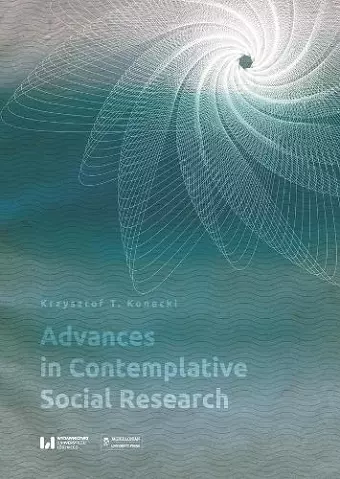Advances in Contemplative Social Research
Format:Paperback
Publisher:Uniwersytet Jagiellonski, Wydawnictwo
Published:7th Jun '19
Currently unavailable, and unfortunately no date known when it will be back

The book is about a new paradigm in social sciences, contemplative inquiry. It concerns theory, methods of research,and practical applications. Deep contemplation of a situation could be an epistemological choice for social scientists. It is a fundamentally different approach to research, whereby the investigator is researching not only the object, but also the situation of research and herself/himself in it. Contemplating is a dual way of approaching the truth. It does not mean that the researcher is mentally divided; on the contrary she/he wants to be complete and achieve the unity of being as a researcher-human being and as an element of the situation (psychosocial and historical). Contemplating enables researchers to see how the mind works and create images and reports from the field: What is available for the mind and what is silent or repressed because of the dominating rhetoric of description and rhetoric of feeling? Contemplation is not only analysis, it is also an ethical choice of stopping here and now to see the situation clearly and reporting it together with all th reservations that could result from the mindfully observed interaction of mind, self, and situation at one historical moment.
This book is unique and audacious, and fits very well with current tendencies within qualitative research. It introduces new, fresh threads to questions and concerns that are highly significant for contemporary social science. The formulated conclusions go beyond directly methodological issues, posing key philosophical questions to the whole project of western sociology. The critical potential of the adopted perspective would allow the author to throw the question of reflexive scientific examination in social sciences into doubt to the extent comparable with that of the deconstruction of sociology once performed by Baudrillard. The author does not choose to fulfill this potential. Rather, he pursues the reconciliation of the nondualistic contemplative approach with the discursiveness of western science. He also strongly emphasizes the consistency between the ethical and the cognitive, which is characteristic of the Zen perspective; in our academic reality these two components have been separated and any attempts at their reconciliation result in numerous and rather unmovable difficulties with regard to logic. All this makes the book in question deeply inspiring on various levels of the organization of social science within the contemporary institutional and cultural state of affairs. Without a doubt, this book is worth publishing as it contributes new quality to academic reflection on the social world and the ways of cognising it. -- Grażyna Romańczuk-Woroniecka, University of Warsaw
ISBN: 9788323344186
Dimensions: 239mm x 168mm x 16mm
Weight: 436g
242 pages